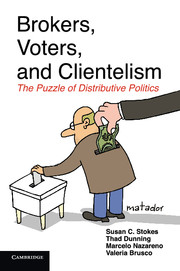Book contents
- Frontmatter
- Dedication
- Contents
- List of Tables
- List of Figures
- Preface and Acknowledgments
- I MODALITIES OF DISTRIBUTIVE POLITICS
- II THE MICRO-LOGIC OF CLIENTELISM
- 2 Gaps Between Theory and Fact
- 3 A Theory of Broker-Mediated Distribution
- 4 Testing the Theory of Broker-Mediated Distribution
- 5 A Disjunction Between the Strategies of Leaders and Brokers?
- 6 Clientelism and Poverty
- III THE MACRO-LOGIC OF VOTE BUYING: WHAT EXPLAINS THE RISE AND DECLINE OF POLITICAL MACHINES?
- IV CLIENTELISM AND DEMOCRATIC THEORY
- Appendix A: Argentina Brokers' Survey
- Appendix B: Argentina Voters' Surveys
- Appendix C: Venezuela Voters' Survey and the Maisanta Database
- Appendix D: India Voters' Survey
- References
- Index
- Miscellaneous Endmatter
3 - A Theory of Broker-Mediated Distribution
Published online by Cambridge University Press: 05 June 2014
- Frontmatter
- Dedication
- Contents
- List of Tables
- List of Figures
- Preface and Acknowledgments
- I MODALITIES OF DISTRIBUTIVE POLITICS
- II THE MICRO-LOGIC OF CLIENTELISM
- 2 Gaps Between Theory and Fact
- 3 A Theory of Broker-Mediated Distribution
- 4 Testing the Theory of Broker-Mediated Distribution
- 5 A Disjunction Between the Strategies of Leaders and Brokers?
- 6 Clientelism and Poverty
- III THE MACRO-LOGIC OF VOTE BUYING: WHAT EXPLAINS THE RISE AND DECLINE OF POLITICAL MACHINES?
- IV CLIENTELISM AND DEMOCRATIC THEORY
- Appendix A: Argentina Brokers' Survey
- Appendix B: Argentina Voters' Surveys
- Appendix C: Venezuela Voters' Survey and the Maisanta Database
- Appendix D: India Voters' Survey
- References
- Index
- Miscellaneous Endmatter
Summary
We have seen that many important facts about nonprogrammatic distribution are not easily explained by accumulated theory. In this chapter, we build a theory of distribution that we subject to empirical inquiry in later chapters. Our theoretical model also provides the building blocks for our later analysis of the choice of party leaders between programmatic, nonprogrammatic, and clientelistic modes of distribution – and therefore helps us understand the political incentives that undergird the decline of clientelism in some settings.
The starting point of our theoretical work is the observation that clientelism entails substantial informational challenges for parties (Chapter 1). To distribute benefits in a highly targeted way, guided by political criteria, and to monitor the actions of voters, parties need fine-grained information about voters' preferences and behaviors. To gather this information, they require brokers. Brokers are local intermediaries who provide targeted benefits and solve problems for their followers; in exchange, they request followers' participation in political activities such as rallies – and often demand their votes. Thus brokers are engaged in sustained and frequent interactions with voters, observing their individual behavior and gaining knowledge of their inclinations and preferences. Brokers can be distinguished from party leaders, who are typically elected officials at higher levels of government or constitute the upper echelons of a nonelected party hierarchy. As such, unlike brokers, party leaders are not usually involved in sustained face-to-face interactions with a particular set of voters.
- Type
- Chapter
- Information
- Brokers, Voters, and ClientelismThe Puzzle of Distributive Politics, pp. 75 - 95Publisher: Cambridge University PressPrint publication year: 2013



